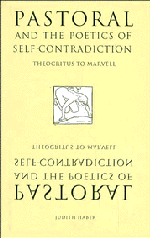Book contents
- Frontmatter
- Contents
- Acknowledgments
- Texts and abbreviations
- Introduction: “Remedies themselves complain”: pastoral poetry, pastoral criticism
- 1 Bringing it all back home: bucolic and heroic in Theocritus' Idylls
- 2 Si numquam fallit imago: Virgil's revision of Theocritus
- 3 Pastime and passion: the impasse in the Old Arcadia
- 4 Complaints themselves remedy: Marvell's lyrics as problem and solution
- Epilogue Farewell to pastoral: The Shepherd's Week
- Notes
- Works cited
- Index
Introduction: “Remedies themselves complain”: pastoral poetry, pastoral criticism
Published online by Cambridge University Press: 17 August 2009
- Frontmatter
- Contents
- Acknowledgments
- Texts and abbreviations
- Introduction: “Remedies themselves complain”: pastoral poetry, pastoral criticism
- 1 Bringing it all back home: bucolic and heroic in Theocritus' Idylls
- 2 Si numquam fallit imago: Virgil's revision of Theocritus
- 3 Pastime and passion: the impasse in the Old Arcadia
- 4 Complaints themselves remedy: Marvell's lyrics as problem and solution
- Epilogue Farewell to pastoral: The Shepherd's Week
- Notes
- Works cited
- Index
Summary
Alas! I look for Ease in vain,
When Remedies themselves complain.
Marvell, “Damon the Mower”This study had a dual genesis: I wished to account for the persistence of the “antipastoral” in pastoral poetry and to arrive at an interpretation of the Renaissance texts that seemed to me to exemplify the problems signaled by that term – the lyrics of Andrew Marvell. Traditionally, the dominant practice among critics of Renaissance poetry has been to view pastoral as a static, idealizing genre, whose goal was the recovery of an Edenic past – a goal that pastoral poets pursued by creating images of idyllicism within their works, and by imitating their predecessors as closely as possible. Poets who failed to meet these criteria – and the list could include every canonical Renaissance poet – were regularly exempted from the genre, and characterized as “antipastoral.” In looking back at classical pastoral, however, I found not a stable origin from which later works deviated, but a mode that worked insistently against itself, problematizing both its own definition and stable definitions within its texts: from the beginning of the genre, presence, continuity, and consolation have been seen as related to – indeed as dependent on – absence, discontinuity, and loss. While the term “antipastoral” seemed, therefore, to be clearly reductive from one perspective, it also clearly answered to a fundamental self-contradictoriness within the genre – a contradictoriness that is frequently registered self-consciously in pastoral poems: the quotation from Marvell that I have chosen for the title of this section could apply to any of the texts I examine, although its paradoxical implications would resonate differently with every one.
- Type
- Chapter
- Information
- Pastoral and the Poetics of Self-ContradictionTheocritus to Marvell, pp. 1 - 11Publisher: Cambridge University PressPrint publication year: 1995

